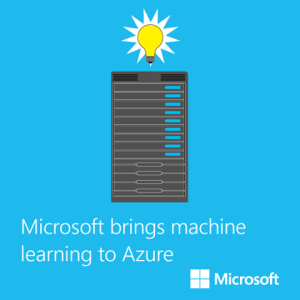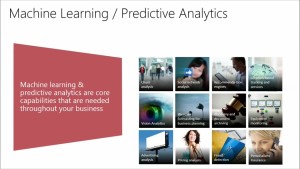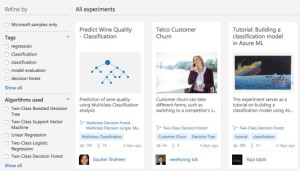Microsoft Boosts Azure with Machine Learning for the Big Data World
At the Strata+Hadoop World Conference recently, Microsoft announced the General Availability of Azure Machine Learning Service. Microsoft’s Azure Machine Learning offering is the ” first general machine learning service ” from one of the leading cloud players out there in the market.
With advanced capabilities, cloud hosting benefits, wider access, stronger support for R, intuitive drag-and-drop development, Azure Machine Language is all set to take the consumerization of Machine Language to the next level.
Watch this incredible video about Why Azure Machine Learning Matters for you!
The Microsoft Azure Machine Learning cloud platform provides simplified yet powerful data management, data transformation and machine learning tools. Through this, Microsoft aims to help organizations process all their data, build APIs and make use of ALL THE DATA in the Cloud with Machine Learning Technology.
The service is essentially designed for machine learning capabilities. Predefined templates and workflows will enable enterprises to produce predictive applications readily in addition to publishing APIs and web services via Azure machine learning platform.
Joseph Sirosh, Corporate Vice President at Microsoft leads the Azure Machine Learning program. Sirosh feels that the platform has a comprehensive set of tools for processing big data regardless of the platform choice. He further explained about the “POTENTIAL” of the ML empowered with Azure Cloud to build application in hours which otherwise could have taken days/months with the assistance of IT team post data set analysis by Data Scientists.
Machine Learning At A Glance:
Machine Learning is a type of data analysis that will empower computers to draw inferences from large chunks of data. Machine Learning is an extremely complex and expensive affair for enterprises and SMBs. With cloud, the operational complexity gets simplified to a great extent.
Platform and Languages:
The beta release of the service took place in June’14 , and in the current announcement, Microsoft has mentioned some add-ons over the service.
Azure now offers Python and R programming language for developers to work on this platform. Azure is also going full throttle by offering the ability to run Hadoop on Ubuntu Linux, paving way for Linux scripts on Azure. The platform also supports Hadoop and Spark. All these elements have truly widened the choice for the user community.
The flexibility is superior which is highlighted by the below facts:
• Can upload custom R packages
• Can create custom data ingress/egress modules
• Can apply arbitrary R operations for data transformation
• Can also productionize models through the machine-learning API
Microsoft has also made available now “Storm for Azure HDInsight”. Storm is an open-source stream analytics tool that brings a great capability to process millions of data events in real time as they are generated by multiple sensors and devices. This will be extremely relevant and useful for organizations that may be building out an Internet of Things strategy.
T.K. Rengarajan, Corporate Vice President for Data Platform at Microsoft, said that Storm will be available for both .Net and Java with the ability to develop, deploy, and debug real-time Storm applications directly in Visual Studio helping developers to be more productive.
Machine Learning Marketplace:
Microsoft is making the market even more competitive for the cloud players, by offering 20 starter experiments to buy machine algorithms at the outset. It is also making it open to invite and encourage Data Scientists to test their ideas. Sirosh says that Microsoft intends to build a wide array of tools in the marketplace in the long run to enable a wider choice for user to select tools directly to use rather than invest time to build. The idea is also to enable customers to find APIs and finished services, such as forecasting, fault detection, recommendations for quicker deployments.
Microsoft is also partnering with Informatica to bring its Informatica Cloud agent for Linux and Windows virtual machines to the Azure Marketplace
Data Visualization:
Azure Machine Language has in-built capabilities for data visualization. It is also compatible with Microsoft Power BI and iPython Notebook for next level view of the processed data and further plotting.
Pricing:
The service will come at a price of
• $US9.99 /seat /month
• $1 / hour for use of the developer community
• $2 /every compute hour
• $0.50 / every 1,000 transactions
Early adopters:
Include the retail chain Pier 1, energy industry systems provider eSmart Systems and Carnegie Mellon University.
To Conclude..
Microsoft is truly bringing new and broad capabilities to handle big data workloads in the cloud world. Azure Machine Language is one more brave step in Microsoft’s “cloud first, mobile first” strategy. It is certainly more likely to fetch Microsoft more revenue compared to services in Azure like PaaS, SaaS, IaaS. Organizations that will be using Azure Machine Language can certainly be more tempted to try Microsoft cloud services compared to competitors.
The offering totally speaks volumes about its core – “SIMPLICITY AT HEART” while arming a developer/data scientist with the much needed desired flexibility. Microsoft has done a commendable job in curating some solid algorithms which otherwise may require anyone to have a deep knowledge of machine learning.
The coolest thing that Microsoft has achieved I feel is the absolute zero requirement to install any hardware or software for a user to experience and learn advanced analytics. Data scientists can build applications and publish APIs in R Code or Python or a combination of both within few clicks. None of the competitors today are offering today an INTEGRATED suite that’s fully managed for the user. A lot of improvements have been made into the ecosystem by adding a diverse set of elements to offer choice to the user. Microsoft has continued reaching toward openness with critical moves like Linux IaaS support and Node.js support. The Azure cloud does indeed provide an easy way for enterprises to ramp up large-scale machine learning jobs who would like to lead the technology wave!
Anita Raj
Technology Evangelist
Team @MSExchangeguru





